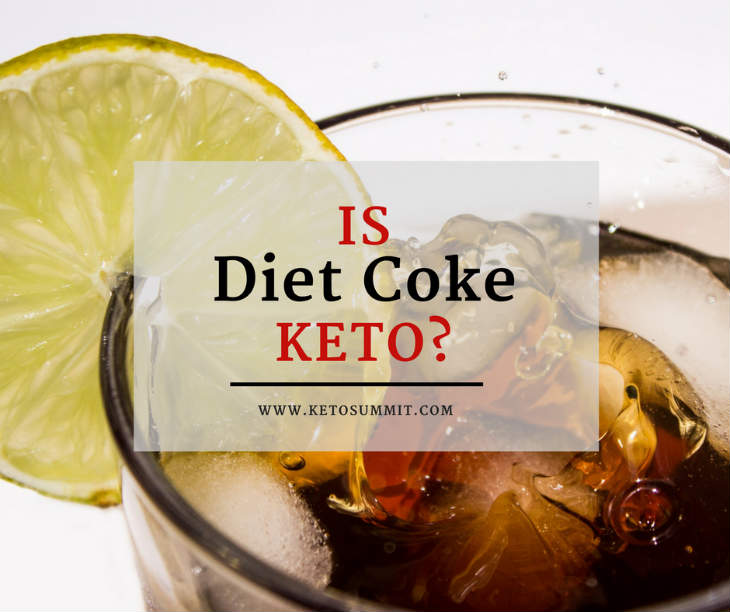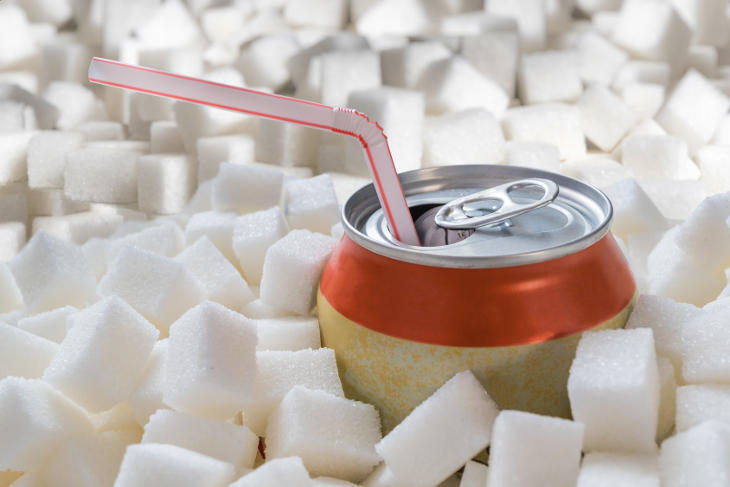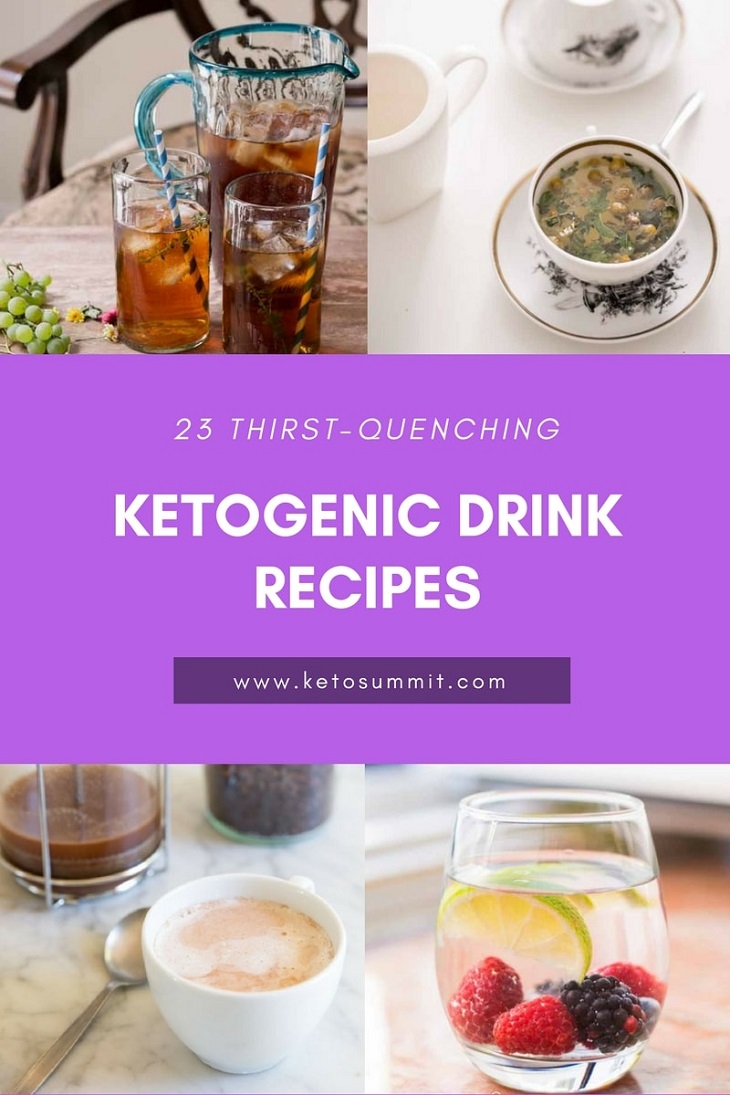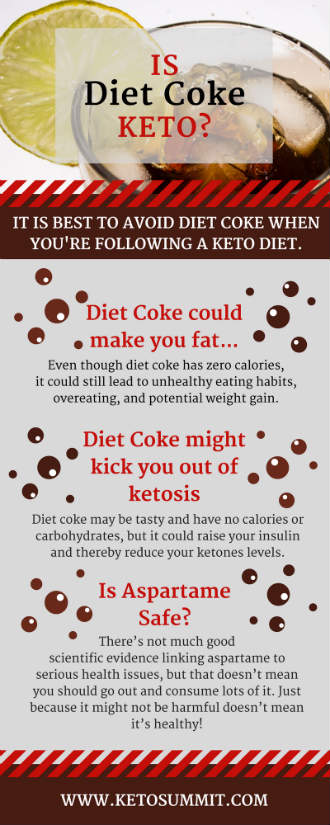Do Diet Drinks Stop Ketosis
Is Diet Coke Keto?
Tasty, energizing, low in carbohydrates and zero sugar – the perfect keto drink. Or is it? What I have described is Diet Coke, one of the most popular low-calorie sodas on the market.
But can you drink it safely on a keto diet?

It's Delicious and Low Carb…So Can I Drink Diet Coke on Keto?
I'm going to jump the gun and just state the obvious…
Diet coke isn't healthy, but the occasional Diet Coke will not ruin your keto diet!
What you need to understand though, is that diet sodas cannot be justified from a nutritional standpoint. These drinks are not healthy and should not be a regular feature of any healthy diet.
Beginners on the keto diet often think it is OK to eat unhealthy foods as long as it's low carb and keeps your ketone levels high.
You might be able to get some results that way in the short term, but your long-term health will be affected.
Keto is a great way to help you lose weight, but you should achieve ketosis using a healthy keto diet. That means you have to cut out unhealthy foods like Diet Coke, or at least minimize your intake dramatically.
Bottom Line:
Avoid Diet Coke on Keto – it's not nutritious even if it is low carb.
What About Coke Zero, Diet Dr. Pepper or Pepsi Zero with your Keto diet?
We've already given away the punchline that Diet Coke isn't ideal for a healthy lifestyle. But is it okay for your Keto diet to have Coke Zero, Pepsi Zero or other popular brands of cola?
To best answer this question, let's first look at their nutritional values.
Coke Zero, Diet Dr. Pepper and Pepsi Zero all contain no carbohydrates, fat or protein, and have zero calories. They are similar to Diet Coke in this way.
All of them contain small amounts of Sodium and Potassium – but only 2% of the recommended Daily Value. There are much more efficient ways to get these nutrients, so we can't recommend them on this basis.
There is one other important thing these colas have in common: artificial sweeteners.
Diet Dr. Pepper and Pepsi Zero both contain aspartame, the same artificial sweetener found in Diet Coke.
Coke Zero is sweetened with both aspartame and acesulfame potassium (Ace-K). Ace-K is another high-intensity sweetener, and is about 200 times sweeter than sugar. And like aspartame, it is controversial.
Ace-K has been declared safe for human consumption up to 15 mg/kg/day (equivalent to about 20 cans of Coke Zero per day). Still, some animal studies indicate it may have unwanted neurological or metabolic effects. (1, 2)
So it's apparent that these alternative colas aren't any better, and like Diet Coke, they could derail your healthy lifestyle if consumed regularly.
As I wrote above, I'm stating the obvious here, but you might want to dig a bit further…
- Does Diet Coke make you fat?
- Does Diet Coke kick you out of ketosis?
- Or does the aspartame artificial sweetener in Diet Coke cause cancer?
- How many carbs are in a Diet Coke?
- Do artificial sweeteners affect ketosis?

Diet coke could make you fat…
I know this is a controversial topic, so let me explain.
Yes, Diet Coke does not contain any calories and calories do play a part in weight-loss and weight-gain. So, technically, Diet Coke in the abstract doesn't make you gain weight.
But your weight isn't just determined by calories in and calories out…
In particular, the artificial sweeteners in diet sodas (like aspartame in Diet Coke or sucralose in diet Pepsi) could be to blame. (1)
As the author of this mini-review (1) explains:
[W]hile people often choose "diet" or "light" products to lose weight, research studies suggest that artificial sweeteners may contribute to weight gain.
For example, the San Antonio Heart Study found that people who drank diet soda had higher BMIs. (2)
And in another study where participants replaced regular sugary soda with diet soda, there wasn't a meaningful reduction in BMI over the length of the study (25 weeks) except for the participants with the most weight to lose. (3)
There are several possible reasons for the link between diet sodas and weight-gain:
- Artificial sweeteners can enhance appetites just like regular sugar. (4) Health Coach Nathan Marsala notes, "Artificial sweeteners alter our cravings and the reward centers in the brain and gut that results in cravings for more sugary foods and simple carbohydrates."
- Compensatory overeating: you are likely to eat more calories when you drink diet sodas to overcompensate for the zero calories in your drink. (5) Registered Nurse Juli Romero, RN calls this the "Hamburger, large fries, and a diet soda please" syndrome. She explains, "Consuming artificial sweeteners and no calorie drinks can lead to eating more food and calories due to feeling 'ok' with larger portions because of the calories 'saved' by having a diet drink."
- Lack of nutrients in artificial sweeteners could make you want to eat more because you don't feel satisfied after eating. (6)
Bottom Line:
Even though Diet Coke has zero calories, it could still lead to unhealthy eating habits, overeating, and potential weight gain.
And Diet Coke might kick you out of ketosis
Even if you think you can control your appetite and not overeat, it's possible that drinking Diet Coke could knock you out of ketosis.
Debates about what will and won't lower your ketone levels are a constant feature of the keto diet community.
While there's no definitive scientific evidence, several n=1 self-experiments have shown that diet sodas could lower your ketone levels. (7, 8)
The reason for the decreased ketone levels could be because artificial sweeteners like aspartame in Diet Coke raise insulin levels and thereby decreases ketone levels.
So, when you drink diet sodas like Diet Coke, you could be:
- Increasing your insulin levels
- Reducing your ketone levels.
- Knocking yourself out of ketosis.
Bottom Line:
Diet coke may be tasty and have no calories or carbohydrates, but it could raise your insulin and thereby reduce your ketones levels. If you are looking to boost your ketone levels, listen in here.

Is Aspartame Safe? The Jury Is Still Out
Aspartame is the sweetener in Diet Coke as well as coke zero, and it's also known by the brand names NutraSweet, Equal, Sweet One. It has been used as an artificial sweetener for a long time, and countless hours of research have been dedicated to researching it.
Dr. Christiane Northrup, M.D., says that Diet Coke has an addictive quality. "It is a combination of aspartame, which is an excitotoxin that actually kills brain cells, but before they die, there's this sort of heightened jolt to the brain, aspartame and caffeine. And caffeine, of course, is a neurotoxin, but it's okay in small doses. But the combination of aspartame and caffeine is particularly addictive in certain kinds of brains."
Despite all the scrutiny, it's still unclear whether aspartame is safe or not. In general, there seem to be 3 potential concerns about aspartame:
Aspartame Leads To The Creation of 'Free Methanol'
One worrying effect of aspartame is the way it is broken down into methanol in your body. (9) As a chemical, methanol occurs naturally and can be found in other sweet drinks, but the methanol found in aspartame works in very unnatural ways.
The key difference between naturally occurring methanol and the methanol found in aspartame is how it is processed. Natural methanol is generally bound to pectin, which allows it to pass through the digestive system without entering the bloodstream.
Methanol found in aspartame is only lightly bound to the phenylalanine molecule and separates easily, becoming 'free methanol'. This molecule of methanol can then easily be converted to formaldehyde, a known carcinogen. (10)
However, many other foods (including fruit juice) create way more methanol than aspartame-sweetened drinks. So the levels found in Diet Coke is not considered dangerous.
Aspartame Could Decrease Serotonin Levels
One of the compounds aspartame is broken down into is phenylalanine, and the presence of phenylalanine above natural levels could decrease serotonin levels. (12)
Reduced serotonin levels have been linked to a variety of disorders, including depression. (13)
But I Heard Aspartame Causes Cancer
The American Cancer Society (ACS) states:
"Most studies in people have not found that aspartame use is linked to an increased risk of cancer." ( 14 )
And the European Food Safety Authority (EFSA) found no "potential risk of aspartame causing damage to genes and inducing cancer" after examining hundreds of studies. (15)
While there have been some studies linking aspartame to cancer, the vast majority of studies seem to suggest no link is present. And that's what the ACS, FDA, and EFSA have based their recommendations on.
Bottom Line:
There's not much good scientific evidence linking aspartame to serious health issues, but that doesn't mean you should go out and consume lots of it. Just because it might not be harmful doesn't mean it's healthy!
How many carbs are in a Diet Coke?
The nutritional label on a Diet Coke reads 0 Calories, 0g Fat, 40mg Sodium, 0g Total Carbs, 0g Protein. So there are actually zero carbs in Diet Coke.
But while a low carb count is generally what we shoot for on Keto, we need to keep the big picture in mind.
Diet Coke contains several problem ingredients: artificial sweeteners, preservatives, and colorants, none of which are optimal for sustaining a healthy lifestyle.
So definitely keep your eyes on the carbs, but we also want to avoid mysterious and hard-to-pronounce ingredients that may have negative effects on our health.
Do artificial sweeteners affect ketosis?
There is some evidence that suggests that artificial sweeteners do affect ketosis – and not in a good way.
Some research shows that artificial sweeteners impact the brain's ability to regulate appetite. (1) Researcher Greg Neely, Associate Professor from the University of Sydney notes that, "When sweetness versus energy is out of balance for a period of time, the brain recalibrates and increases total calories consumed."
One of the reasons we love a ketogenic diet is that it tends to suppress the appetite, which contributes to its effectiveness for weight loss and improved metabolic health. Artificial sweeteners may actually counteract this effect, causing you to overeat, thereby increasing blood sugar and reducing ketones.
And as noted above, aspartame – the sweetener found in all of the leading diet colas – is suspected of raising insulin levels, which can also decrease ketone production.
Ace-K, one of the sweeteners in Coke Zero, is low in carbohydrates, but it might still have a negative effect on ketosis. Some research on rats found that Ace-K, like aspartame, can increase the body's insulin production. (1)
The same is true with sucralose, a sweetener commonly found in baked goods and other processed foods. A 2013 study found that eating sucralose caused increased blood sugar and insulin levels. (1)
And there is yet another way artificial sweeteners can affect ketosis. They can disrupt the beneficial flora in the gut that helps to regulate blood sugar and keep pathogens at bay. (1,1)
The common thread here is worsened blood glucose and insulin regulation. Anything that increases blood sugar or insulin has the potential to reduce ketone production and kick you out of ketosis.

Drink these Keto sodas instead of Diet Coke:
It is not all doom and gloom though. There are many keto-friendly drinks.
These keto-friendly sodas have been crafted to give you that tasty drink you crave, while keeping you firmly in fat burning ketosis:
- LaCroix, a sweetener-free fizzy drink that uses a blend of natural flavors.
- Homemade sodas, where you combine sparkling water with the flavorings and sweeteners of your choice. If you are really concerned about what goes into your body, this is the best option. For specific recipes, check out this massive list of keto drink recipes.
As Registered Dietitian Nutritionist Michelle Dudash, RDN, observes, "The end goal…should be to reduce the amount of soda, regardless of the type. It's prudent to replace artificially sweetened foods with more nutrient-rich, lower sugar foods."
Bottom Line:
Skip the Diet Coke and make your own Keto drinks instead. Or else give flavored sodas like LaCroix a try.
Pinterest Image For Is Diet Coke Keto?
Please pin the image below so that you and others can quickly and easily remember if Diet Coke is good for Keto.

Louise
Louise co-founded Louise's Foods, Paleo Living Magazine, Nourishing Brands, & CoBionic. She has considerable research experience but enjoys creating products and articles that help move people just a little bit closer toward a healthy life they love.
Source: https://ketosummit.com/is-diet-coke-keto/